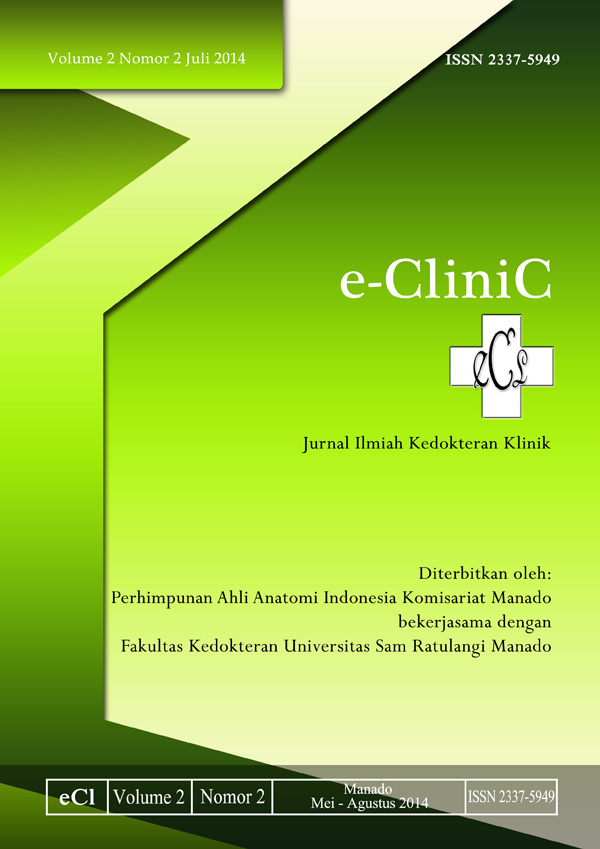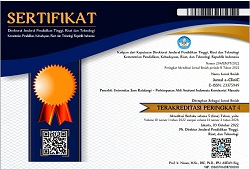TINGKAT PENGETAHUAN IBU MENYUSUI TENTANG PEMBERIAN ASI EKSKLUSIF DI BAGIAN OBSTETRI DAN GINEKOLOGI BLU RSU PROF. DR. R. D. KANDOU MANADO
DOI:
https://doi.org/10.35790/ecl.v2i2.5425Abstract
Abstract: Breast milk is the best food for infants, it can not be replaced with other foods and no one food that can substitute for breast milk. Breast milk is the one of food types that meet all the needs of infant's elements . The elements include physical, psychological, social, and spiritual. Breast milk contains nutrients, hormones, growth factors elements of immunity, anti-allergic, and anti-inflammatory. Methods: This is a descriptive study with cross sectional approach. This study was conducted with samples taken randomly in the postpartum section of Obstetrics Gynecology of Prof. DR. RD Kandou Public Hospital in Manado city. the total numbers of samples is 50 mothers. The data was collected using a questionnaire interview. Results: From the results obtained, based on age less than 20 years of 22%, 21-25 years of 8%, 26-30 years of 28%, 31-35 years of 24%, more than 36 years of 18%. Educational levels of samples are elementary of 8%, junior high school of 18%, senior high school of 62%, and college of 4%. Based on the occupation that working outside home of 32%, while mothers who working in house as much as 22% and 46% mothers is a housewife. Based on the level of mothers knowledge towarda exclusive breastfeeding was found and most mothers have a sufficient level of knowledge about exclusive breastfeeding with 62% rates. Under the provision, we found 22% Exclusive breastfeeding mothers.  Conclusions: It is recommended that mothers should improve their knowledge of exclusive breastfeeding and exclusive breastfeeding attitude, therefore the infants needs can be fullfilled well.
Keywords: Knowledge of the mother, Breastfeeding, Exclusive breastfeeding
Â
Â
Abstrak: ASI merupakan makanan terbaik bagi bayi, tidak dapat digantikan dengan makanan lainnya dan tidak ada satupun makanan yang dapat menggantikan ASI. ASI adalah satu jenis makanan yang mencukupi seluruh unsur kebutuhan bayi baik fisik, psikologi, sosial, maupun spiritual. ASI mengandung nutrisi, hormon, unsur kekebalan faktor pertumbuhan, anti alergi, serta anti inflamasi. Metode: Penelitian ini bersifat deskriptif dengan pendekatan cross sectional. Penelitian ini dilakukan dengan pengambilan sampel yang diambil secara acak di ruang nifas bagian Obstetri Ginekologi BLU RSU Prof DR. R.D Kandou Manado, dengan jumlah sampel berjumlah 50 orang. Pengumpulan data dilakukan dengan wawancara menggunakan kuesioner. Hasil: Dari hasil yang didapatkan, berdasarkan umur kurang dari 20 tahun 22%, 21-25 tahun 8%, 26-30 tahun 28%, 31-35 tahun 24%, lebih dari 36 tahun 18%. Berdasarkan pendidikan SD 8%, SLTP 18%, SLTA 62%, Akademik/D3 4%. Berdasarkan pekerjaan yang bekerja diluar rumah 32%, sedangkan yang bekerja didalam rumah sebanyak 22% dan tidak bekerja atau IRT 46%. Berdasarkan tingkat pengetahuan ibu tentang ASI eksklusif didapatkan bahwa paling banyak ibu memiliki tingkat pengetahuan cukup tentang ASI Eksklusif, yakni sebanyak 62%. Berdasarkan pemberian, didapatkan 22% ibu memberikan ASI Eksklusif. Simpulan: Disarankan kepada ibu agar lebih meningkatkan pengetahuan tentang ASI Eksklusif dan juga sikap pemberian ASI Eksklusif agar kebutuhan bayi bisa terpenbuhi dengan baik.
Kata kunci: Pengetahuan Ibu, Pemberian ASI, ASI Eksklusif
Downloads
How to Cite
Issue
Section
License
COPYRIGHT
Authors who publish with this journal agree to the following terms:
Authors hold their copyright and grant this journal the privilege of first publication, with the work simultaneously licensed under a Creative Commons Attribution License that permits others to impart the work with an acknowledgment of the work's origin and initial publication by this journal.
Authors can enter into separate or additional contractual arrangements for the non-exclusive distribution of the journal's published version of the work (for example, post it to an institutional repository or publish it in a book), with an acknowledgment of its underlying publication in this journal.
Authors are permitted and encouraged to post their work online (for example, in institutional repositories or on their website) as it can lead to productive exchanges, as well as earlier and greater citation of the published work (See The Effect of Open Access).







